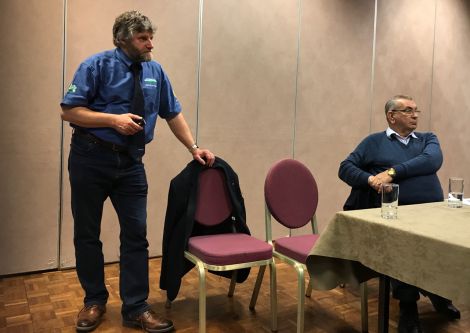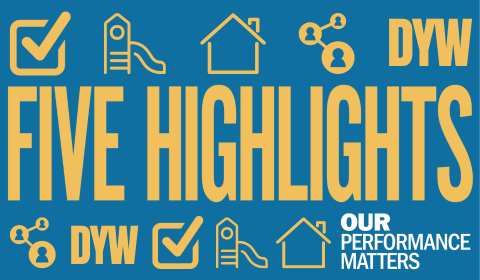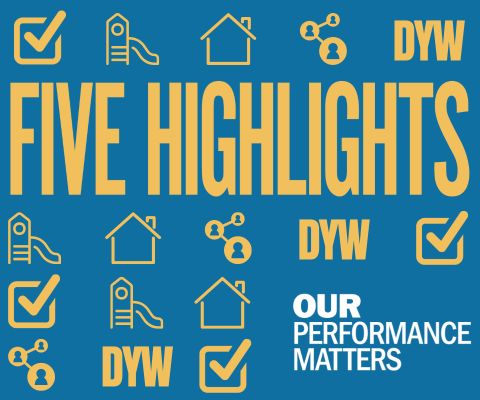News / NFU outlines ideas for post-Brexit future
THERE was a healthy turnout and a generally enthusiastic response from local crofters and farmers to the National Farmers’ Union of Scotland (NFUS)’s proposals for a new way of funding agriculture once the UK leaves the EU.
Around 50 people attended Tuesday night’s meeting at the Shetland Hotel in Lerwick, where NFUS vice president Martin Kennedy set out the union’s vision of moving from an “area-based” to an “action-based” mechanism for subsidising the work of crofters and farmers.
Kennedy said the turnout reflected that people “have got a lot of concerns, and particularly for areas like Shetland, support is still key for keeping these areas and communities alive”.
During a half-hour presentation, followed by a Q&A session and workshop, Kennedy explained that NFUS recognised the need to be “quick off the mark” after many were surprised that the UK voted in favour of Brexit last June.
Crofters and farmers have been involved in the Common Agricultural Policy (CAP) for 43 years and, while it has “to an extent maybe stifled innovation”, there is “a great concern that it’s not going to be there”.
Kennedy said the agriculture industry knew a funding package would be coming to Scotland, and it was essential to ensure it was at least maintained at its current level, albeit allocated in a different manner.
He said Scottish farmers needed to export around 90 per cent of lambs and a lot of that does go into Europe, meaning “friction-free” trade without barriers will be essential.
Kennedy said the longer term goal was to wean agriculture off reliance on state subsidies by improving market conditions – but it is facing the reality of an era of cheap food and consumers now spending just eight per cent of their income on food compared to 40 per cent half a century ago.
Become a member of Shetland News
“We’re not getting enough from the market to do without that support,” he said. “Relatively speaking, it [food] is seriously cheap, far too cheap, but we don’t get recognition for that.”
While Brexit negotiations are not proceeding particularly well, with the future of Theresa May’s government far from secure, the NFU is planning on the assumption that the UK will enter a transition period of around three years from March 2019.
It doesn’t anticipate huge changes before 2022, but once the UK fully controls its agriculture policy Kennedy foresees a new approach to financial support ensuring “every eligible hectare receives the same payment regardless of land type or farming system”.
He praised the Shetland contingent present – “the youngest crowd, going up and down the country” – and said the new system had to encourage those who are “innovative and wanting to drive things forward”.
Kennedy was heartened that there is enthusiasm across the board – from experienced industry figures such as Robert Nicolson and younger farmers such as Jamie Leslie alike: “They were keen to see that action-based system coming through as well, so that was positive to hear.”
NFUS wants a move away from blanket support payments towards rewarding greater innovation and productivity, which Kennedy said wasn’t mutually exclusive from environmental measures to improve biodiversity and water quality and to tackle climate change.
He spoke of talks with councils in Tayside about ensuring that local produce such as lamb are brought back onto school dinner menus.
NFU Shetland chairman Jim Nicolson welcomed that idea, which could be a great way of broadening the market for a product local farmers are “struggling to sell”.
The light lamb market has been hit by the weakness of southern European economies such as Greece, Italy and Spain.
“We do have a lot of light lambs and there’s not a great market,” he said. “One suggestion being, as does happen in some areas, that creating a mince – very palatable, very enjoyable – which could go into lasagnes and that kind of thing.”
More generally, Nicolson said it was an “excellent turnout” and folk “really got engaged” with the NFUS proposals and came up with “quite a lot of constructive ideas” for the union to consider.
“The major difference is there’s almost certainly going to be a move away from an area-based system to one that will have a level of headage-based, but a fair number of other things along with that,” he said.
Nicolson said environmental improvements to safeguard the levels of lime and nutrients in the soil would play a part. “In Shetland that would almost certainly mean growing grass for silage, but it would be probably desirable to have areas ploughed up every 5-10 years.”
The government may well decide on something different, he acknowledged, but it seems clear that the era of “area-based” payments is coming to an end. That is mainly to tackle the problem of landowners keeping their land empty – more of an issue in upland areas of Scotland than it is in the islands.
Nicolson said favourable trading conditions would be crucial to maintaining a market for larger Suffolk cross and Texel lambs: “A lot of them go to France and other areas, and that could be a major concern if there were tariffs [post-Brexit].”
He added that a soft Brexit was likely to be “much better for crofters and farmers”.
Become a member of Shetland News
Shetland News is asking its readers to consider paying for membership to get additional perks:
- Removal of third-party ads;
- Bookmark posts to read later;
- Exclusive curated weekly newsletter;
- Hide membership messages;
- Comments open for discussion.
If you appreciate what we do and feel strongly about impartial local journalism, then please become a member of Shetland News by either making a single payment, or setting up a monthly, quarterly or yearly subscription.





























































